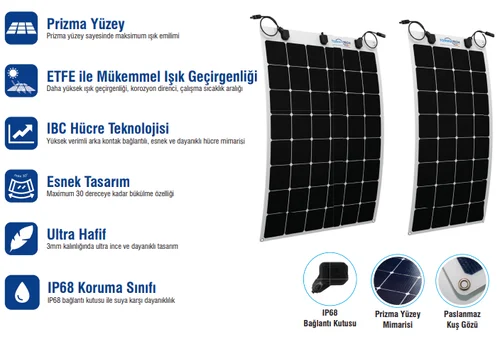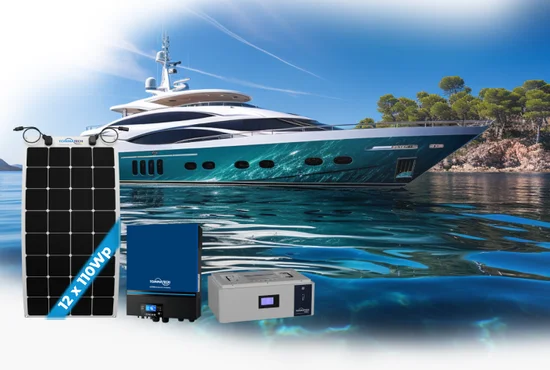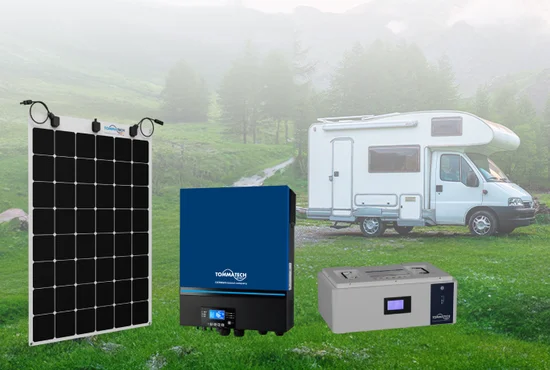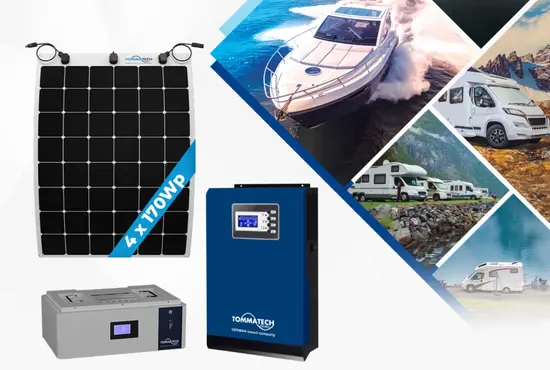

Flexible solar panels which go beyond the limits of traditional solar modules, enable you to meet your energy needs everywhere with their lightweight, portable, and durable structures. They are ideal for energy generation on limited surfaces and mobile structures. These products, which you can easily use in boats, yachts, and caravans, offer energy freedom on your travels or in nature.
Compared to traditional solar modules, these new flexible solar panels are ultralight, thin, high-performance, and flexible due to their construction.
They consist of a state-of-the-art 7-layer lamination technology and contain a high light transmittance ETFE (Ethylene Tetra Fluoro Ethylene) polymer, robust fiberglass, and high-efficiency IBC solar cells. The combination of ETFE and fiberglass makes the module extremely robust. With a maximum bend of 30 degrees and a low weight, it adapts perfectly to any surface
You can use the following communication channels
for all your applications and questions.
With their lightweight structure, easy installation, and durability, flexible solar panels offer an ideal solution for anyone looking to meet their energy needs. Particularly for owners of watercraft such as boats and yachts, as well as caravan owners, flexible solar modules offer great advantages. Thanks to their construction, they are designed to withstand harsh conditions such as tight spaces, constant movement, and saltwater on sea vessels, thus ensuring a continuous and uninterrupted power supply.
Flexible solar modules are the ideal energy source for applications such as boats, yachts, and motorhomes, where off-grid systems are often used. They offer an effective alternative for anyone who wants to be energy independent in areas without a grid connection. Flexible solar modules not only reduce energy costs but are also environmentally friendly. Thanks to their aesthetic and functional properties, they are also ideal for industrial and commercial applications.
The new generation of flexible solar panels from CW Enerji and TommaTech are made of high-quality ETFE polymer and high-efficiency back-contact cells. With its ultralight, thin, and up to 30-degree flexible structure, it adapts perfectly to the curved surfaces of boats and yachts. These marine solar panels , offered in 110Wp and 170Wp power options, are a durable and reliable energy source in marine conditions thanks to their resistance to breakage and corrosion. The flexible solar panels from CW Enerji offer environmentally friendly and efficient solutions for energy independence at sea.


Flexible solar panels, thanks to their bendable structure, easily adapt to curved surfaces and meet the energy needs of your caravan by converting sunlight into electrical energy. These panels offer a lightweight, durable and practical solution, making life in a caravan more free and environmentally friendly. Flexible solar panels from CW Enerji and TommaTech stand out in this area due to their high performance and long-lasting structure.
Flexible solar panels, in combination with off-grid inverters and lithium-ion batteries, offer the perfect solution for the energy needs of boats, yachts and motorhomes. Flexible solar panels are an excellent solution for generating energy in mobile vehicles such as yachts, boats and caravans. Flexible solar panels easily adapt to the surface and convert sunlight into electrical energy.
The generated energy is converted from direct current (DC) to alternating current (AC) by an off-grid inverter and made available for use in devices. In addition, excess energy can be stored in lithium batteries and used at night or when there is insufficient sunlight. With complete ready-to-use systems with flexible solar panels, you can ensure your energy supply is independent and sustainable.

When selecting flexible solar panels the quality of the materials used, cell technology, and production standards are of great importance. The next generation of flexible solar modules from CW Enerji and TommaTech features an advanced structure made of highly transparent ETFE polymer, durable fiberglass, and high-efficiency IBC solar cells. These panels are manufactured using a 7-layer lamination process and meet international quality standards.
The IBC solar cells used in CW Enerji and TommaTech flexible solar panels feature a special technology embedded in a copper base. Thanks to this structure, the panels are more resistant to breakage and loss of strength due to corrosion when bent or exposed to a humid environment compared to conventional panels. Furthermore, thanks to bypass diodes and an efficient cell architecture, it continues to generate energy even in low light and shadow conditions, thus reliably meeting the sustainable energy needs of users. These features make our flexible solar modules a durable and high-performance energy solution.
The prices for flexible solar panels vary depending on the quality of the materials, cell efficiency, size, and manufacturer. Although the initial costs may be higher compared to conventional modules, flexible panels offer many long-term advantages due to their flexibility, lightness, and robustness. In particular, their ability to reliably generate energy even under harsh conditions makes them an attractive alternative. Flexible solar panels from renowned manufacturers such as CW Enerji and TommaTech are characterized by high performance and durability.
The prices for flexible solar modules and flexible solar panels package systems can vary depending on the number of solar modules required, energy consumption, and the type and power consumption values of electrical devices that influence energy consumption. The off-grid inverter, which matches the power demand, and the lithium battery capacity, which corresponds to the energy storage requirements, also influence the price.
The calculation of flexible solar panels takes into account criteria such as energy demand, usable surface area and module efficiency. First, it is important to determine your daily energy consumption and calculate the panel power that meets this demand. In addition, the size of the area on which the panels are installed is a critical factor affecting efficiency. For a more accurate assessment, it may be necessary to include additional products such as off-grid inverters and lithium batteries in the system. To get the best offer for you, you can fill out the form now and our expert teams will contact you.
IBC (Interdigitated Back Contact) technology describes a solar cell in which the electrical contacts are arranged on the back rather than the front. This design allows for more efficient use of light and reduces electrical losses, resulting in higher efficiency.
Yes, flexible solar panels from CW Enerji and TommaTech are water resistant and can be used in humid and rainy environments without any problems. Their properties make them ideal for use on boats, RVs and roofs.
Flexible solar panels typically offer 10 to 15 percent efficiency. Traditional rigid panels can achieve 15 to 20 percent efficiency. Although flexible panels are slightly less efficient, they may be preferable due to their advantages such as flexibility and lightness.
Flexible solar panels can be easily installed on uneven, curved or inclined surfaces thanks to their flexible structure. These properties make them ideal for various applications such as boats, yachts, caravans and roofs.
Flexible solar panels are typically made of thin-film photovoltaic cells and flexible plastic or composite materials. This structure gives the panels lightness, flexibility and durability.
The lifespan of flexible solar panels varies depending on the materials used and production quality. The lifespan is generally 10 to 20 years. This period can be extended with regular maintenance and proper use.